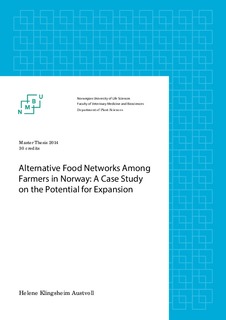| dc.contributor.author | Austvoll, Helene Klingsheim | |
| dc.date.accessioned | 2014-11-13T12:46:58Z | |
| dc.date.available | 2014-11-13T12:46:58Z | |
| dc.date.copyright | 2014 | |
| dc.date.issued | 2014-11-13 | |
| dc.identifier.uri | http://hdl.handle.net/11250/225848 | |
| dc.description.abstract | The industrialization of agriculture has lead many farmers into a situation of economic squeeze with increasing costs, falling income and high financial debt. In addition it has disconnected them from consumers. As a consequence, many farmers have chosen to engage in alternative food networks (AFNs). Although the emergence of AFNs is an increasing trend in Norway as in other countries, they are still rare among farmers. This thesis explores the potential for the expansion of AFNs among farmers in Norway. I have conducted a qualitative case study, where I have interviewed eight farmers in addition to other agricultural stakeholders who are involved in AFNs. The theoretical background describes the main characteristics of the industrialization of agriculture, and how this bears consequences for sustainability issues at a global level and farmers’ livelihood at a local level. As a result of the case study, I have identified six socio-demographic and political forces and phenomenon in the Norwegian food system that affects farmers’ choice of distribution channel and may restrain or support the expansion of AFNs. The results show that the main motivations for the farmers in the study to engage in AFNs are both the economic and the social enrichment it entails. Due to an added product value and the direct selling, the farmers who are engaged in AFNs can achieve a higher product price in comparison to the mainstream food chain, and can become more economically independent. In addition, as AFNs facilitate communication and cooperation between farmers and consumers, they can diminish loneliness among farmers and reinforce the social dimension of farming. The study also shows that a well-founded knowledge base and more efficient information flows from agricultural organizations to farmers, together with engaged farmers and consumers, create a potential of AFNs to expand to more farmers. The results are discussed in the context of the theoretical background. | nb_NO |
| dc.language.iso | eng | nb_NO |
| dc.publisher | Norwegian University of Life Sciences, Ås | |
| dc.subject | Alternative food networks | nb_NO |
| dc.subject | Community supported agriculture | nb_NO |
| dc.subject | Consumer cooperatives | nb_NO |
| dc.subject | Farmer´s market | nb_NO |
| dc.subject | Farm shop | nb_NO |
| dc.subject | Organic agriculture | nb_NO |
| dc.subject | Agricultural politics | nb_NO |
| dc.subject | Sustainable food systems | nb_NO |
| dc.subject | Small-scale agriculture | nb_NO |
| dc.title | Alternative food networks among farmers in Norway : a case study on the potential for expansion | nb_NO |
| dc.type | Master thesis | nb_NO |
| dc.subject.nsi | VDP::Agriculture and fishery disciplines: 900::Agriculture disciplines: 910 | nb_NO |
| dc.subject.nsi | VDP::Social science: 200::Economics: 210 | nb_NO |
| dc.source.pagenumber | 50 | nb_NO |
| dc.description.localcode | M-AE | nb_NO |
